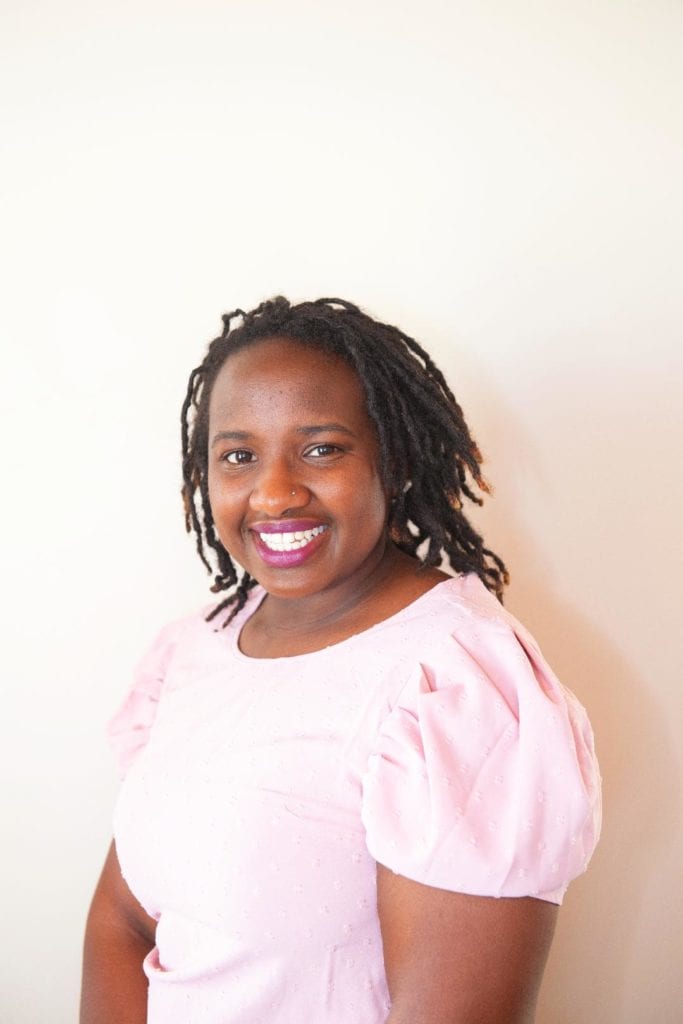

SUPPORTING BLACK MATERNAL MENTAL HEALTH
Nurse-Family Partnership (NFP) nurse TeQuiera will tell anyone within earshot that she has the best job in the world. She supports women and children in her community daily. “What’s not to love?” she says.
But TeQuiera didn’t always have a nursing career in mind. She discovered her calling in a more roundabout fashion. Originally an agricultural economics major in college and often fascinated by numbers more than people, she found her passion for nursing after a friend gave birth to a child with Down syndrome. TeQuiera watched her friend struggle to find support and necessary information and knew there had to be a way to help.
“It was like a wake-up call,” TeQuiera says. “I needed to help her and families like hers, so I switched majors.”
TeQuiera found herself on the labor and delivery track, but birth after birth, she felt like something was missing. While she helped mothers during one of the most important experiences of their lives, the relationship ended there. TeQuiera had more to offer.
This is the most fulfilling job I could ever hope to have. My clients make every day worth it.
“I came across a job listing for Nurse-Family Partnership and it was perfect. It included everything I was looking for,” TeQuiera says. As a nurse with Nurse-Family Partnership® at the Houston County Health Department in Georgia, she is able to support moms one-on-one. She builds longer-lasting relationships and watches babies grow into babbling toddlers.
But that’s not all TeQuiera has accomplished in her six years as an NFP nurse. She also pursues another passion, directly supporting her home community.
Supporting Black Maternal Mental Health
TeQuiera’s work with NFP includes advocating for maternal mental health for the Black community. She grew up in Fort Valley, Ga., a rural community of fewer than 10,000 people. A 2013 community health assessment found a lack of healthcare services available in Fort Valley and higher than average rates of chronic diseases.
“I know what it’s like not to have resources available to you,” TeQuiera says. “That’s why I give back.”
She cites mental health as a particular challenge for the Black community due to stigma around the topic. In fact, TeQuiera spoke at a Black maternal mental health summit in late February 2021 about this issue.
“The biggest concern is you don’t want to be perceived as ‘crazy’ when you really just need professional help,” she says.
In particular, she shared how mental health stigma negatively affects Georgia’s maternal and infant mortality rates. Mothers with poor mental health are at greater risk of complications and preterm labor and are less likely to seek and receive postnatal care. When a mother is unable to take care of herself, it can affect the infant’s outcomes and lead to lower birth weight, higher rates of malnutrition and more hospital admissions.
Georgia’s maternal mortality is 27.7 deaths per 100,000 live births, which is 10.3 more deaths than the national average. Infant mortality is no better at 7.3 deaths per 1,000 live births, compared to the national average of 5.9. Both rates are significantly higher for Black Americans.
TeQuiera’s work with NFP allows her to have a direct connection and trusting relationship with families who may not know what conditions like postpartum depression look like or how to find help. Through her work, TeQuiera presents a friendly face to her clients during difficult conversations, asks the tough but necessary questions to understand what mental health issues someone may be experiencing, and connects moms with appropriate resources.
When thinking of her clients, TeQuiera says, “I always tell my moms that you can’t be 100 percent for your child if you aren’t 100 percent for yourself.”
Where We Go From Here
While families can only do so much to turn the tide, TeQuiera hopes her home state of Georgia will do better by her community. She wants to see maternal and infant mortality rates drop, NFP grow, and conversations about mental health become normalized, especially as the nation grapples with the pandemic’s toll.
More people reported symptoms of anxiety or depression since the pandemic began. New mothers are not experiencing the usual happy events that go along with a new baby, like having family in the delivery room or joining neighborhood playdates, due to social distancing guidance.

“Stay-at-home moms aren’t going to places they would normally,” TeQuiera says. “You can’t stroll through the mall, hold playdates, or even meet relatives. You only have your household, and it’s isolating.”
But hope is on the horizon. Vaccines are becoming more readily available and will make it easier for moms to have safe social outings, see family and experience those happy events.
TeQuiera cannot wait for the day she can see her clients face-to-face again. “This is the most fulfilling job I could ever hope to have. My clients make every day worth it.”

